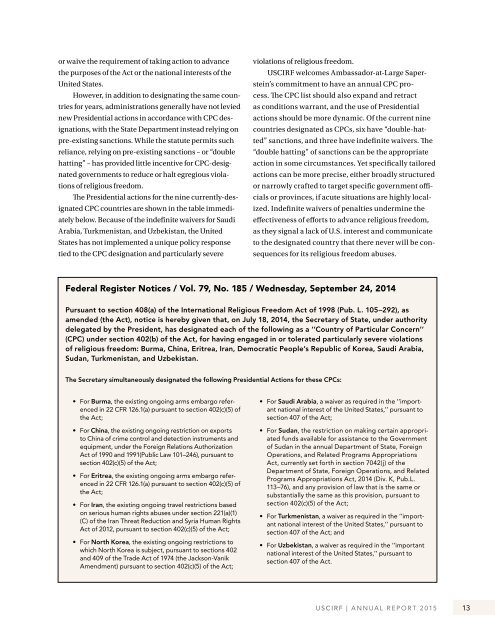USCIRF Annual Report 2015 (2)
USCIRF Annual Report 2015 (2)
USCIRF Annual Report 2015 (2)
You also want an ePaper? Increase the reach of your titles
YUMPU automatically turns print PDFs into web optimized ePapers that Google loves.
or waive the requirement of taking action to advance<br />
the purposes of the Act or the national interests of the<br />
United States.<br />
However, in addition to designating the same countries<br />
for years, administrations generally have not levied<br />
new Presidential actions in accordance with CPC designations,<br />
with the State Department instead relying on<br />
pre-existing sanctions. While the statute permits such<br />
reliance, relying on pre-existing sanctions – or “double<br />
hatting” – has provided little incentive for CPC-designated<br />
governments to reduce or halt egregious violations<br />
of religious freedom.<br />
The Presidential actions for the nine currently-designated<br />
CPC countries are shown in the table immediately<br />
below. Because of the indefinite waivers for Saudi<br />
Arabia, Turkmenistan, and Uzbekistan, the United<br />
States has not implemented a unique policy response<br />
tied to the CPC designation and particularly severe<br />
violations of religious freedom.<br />
<strong>USCIRF</strong> welcomes Ambassador-at-Large Saperstein’s<br />
commitment to have an annual CPC process.<br />
The CPC list should also expand and retract<br />
as conditions warrant, and the use of Presidential<br />
actions should be more dynamic. Of the current nine<br />
countries designated as CPCs, six have “double-hatted”<br />
sanctions, and three have indefinite waivers. The<br />
“double hatting” of sanctions can be the appropriate<br />
action in some circumstances. Yet specifically tailored<br />
actions can be more precise, either broadly structured<br />
or narrowly crafted to target specific government officials<br />
or provinces, if acute situations are highly localized.<br />
Indefinite waivers of penalties undermine the<br />
effectiveness of efforts to advance religious freedom,<br />
as they signal a lack of U.S. interest and communicate<br />
to the designated country that there never will be consequences<br />
for its religious freedom abuses.<br />
Federal Register Notices / Vol. 79, No. 185 / Wednesday, September 24, 2014<br />
Pursuant to section 408(a) of the International Religious Freedom Act of 1998 (Pub. L. 105–292), as<br />
amended (the Act), notice is hereby given that, on July 18, 2014, the Secretary of State, under authority<br />
delegated by the President, has designated each of the following as a ‘‘Country of Particular Concern’’<br />
(CPC) under section 402(b) of the Act, for having engaged in or tolerated particularly severe violations<br />
of religious freedom: Burma, China, Eritrea, Iran, Democratic People’s Republic of Korea, Saudi Arabia,<br />
Sudan, Turkmenistan, and Uzbekistan.<br />
The Secretary simultaneously designated the following Presidential Actions for these CPCs:<br />
• For Burma, the existing ongoing arms embargo referenced<br />
in 22 CFR 126.1(a) pursuant to section 402(c)(5) of<br />
the Act;<br />
• For China, the existing ongoing restriction on exports<br />
to China of crime control and detection instruments and<br />
equipment, under the Foreign Relations Authorization<br />
Act of 1990 and 1991(Public Law 101–246), pursuant to<br />
section 402(c)(5) of the Act;<br />
• For Eritrea, the existing ongoing arms embargo referenced<br />
in 22 CFR 126.1(a) pursuant to section 402(c)(5) of<br />
the Act;<br />
• For Iran, the existing ongoing travel restrictions based<br />
on serious human rights abuses under section 221(a)(1)<br />
(C) of the Iran Threat Reduction and Syria Human Rights<br />
Act of 2012, pursuant to section 402(c)(5) of the Act;<br />
• For North Korea, the existing ongoing restrictions to<br />
which North Korea is subject, pursuant to sections 402<br />
and 409 of the Trade Act of 1974 (the Jackson-Vanik<br />
Amendment) pursuant to section 402(c)(5) of the Act;<br />
• For Saudi Arabia, a waiver as required in the ‘‘important<br />
national interest of the United States,’’ pursuant to<br />
section 407 of the Act;<br />
• For Sudan, the restriction on making certain appropriated<br />
funds available for assistance to the Government<br />
of Sudan in the annual Department of State, Foreign<br />
Operations, and Related Programs Appropriations<br />
Act, currently set forth in section 7042(j) of the<br />
Department of State, Foreign Operations, and Related<br />
Programs Appropriations Act, 2014 (Div. K, Pub.L.<br />
113–76), and any provision of law that is the same or<br />
substantially the same as this provision, pursuant to<br />
section 402(c)(5) of the Act;<br />
• For Turkmenistan, a waiver as required in the ‘‘important<br />
national interest of the United States,’’ pursuant to<br />
section 407 of the Act; and<br />
• For Uzbekistan, a waiver as required in the ‘‘important<br />
national interest of the United States,’’ pursuant to<br />
section 407 of the Act.<br />
<strong>USCIRF</strong> | ANNUAL REPORT <strong>2015</strong> 13


